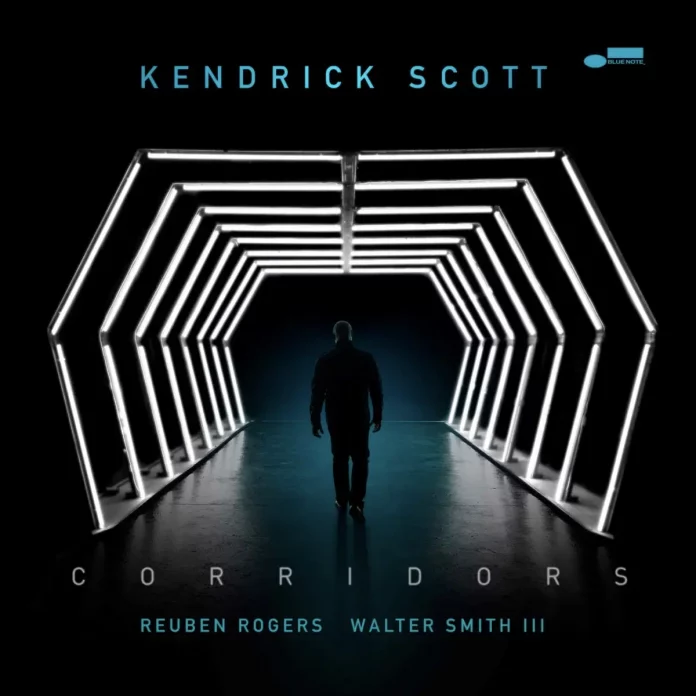On a promotional clip for Kendrick Scott’s What Day Is It? the Houston-born drummer is seen in a soft-lit rehearsal space introducing the piece with a slow backbeat groove that fans out into crisp buzz rolls, high-tuned bop breaks around the toms and, for the remainder of the tune, some free-form interplay with bassist Reuben Rogers and saxophonist Walter Smith III.
It’s the opening cut from Corridors (Scott’s third album for Blue Note), and typifies his musical tastes and direction as an artist and composer. At 42, he is predominantly post-bop in his approach to the drum set, but as a player he stretches as wide as the musical company he’s kept since appearing on the scene in the late 1990s. Indeed, away from his sideman stints with such luminaries as Terence Blanchard, Pat Metheny, Joe Lovano, Kenny Garrett, Herbie Hancock, Gretchen Parlato, Robert Glasper and the Crusaders, to name but a few, broader contrasts within his playing can be heard on albums under his own name or in his outfit Oracle, where the music embraces jazz, R&B, hip-hop, atmospheric soundscapes and spoken word, often around a poignant theme.
Following the 2019 album A Wall Becomes A Stranger – his unshrinking response to Trump’s presidency and the plan to erect a wall at the US-Mexico border – Corridors is Scott’s riposte to the pandemic, and the global impact isolation had on humanity. Originally commissioned by Rio Sakairi for the Jazz Gallery’s Artist Fellowship series, the record was written through lockdown and features eight Scott originals plus an arrangement of the late Bobby Hutcherson’s Isn’t This My Sound Around Me? that perfectly complements the set. Scott’s curious commitment to compose and cut Corridors without any chordal instruments reflects the theme of the record, and how much was lost, constricted or taken away during the epidemic.
With this in mind, the record plays with tension, sensitivity and space to great effect. This is most notably during the disc’s more solemn moments such as One Door Closes – a lush, 40-second multi-tracked saxophone prelude – or A Voice Through the Door, a brush-swept waltz bringing Smith’s light, breathy lines to the fore, first in unison with a feint, wordless vocal from Scott, and later blowing long, whispery notes under an impassioned, bowed solo from Rogers.
Announced with warm slides and ringing harmonics from the bassist, the title track sways from Smith’s rich, lyrical playing to a more freely swung main theme packing some exciting trade-offs between drums and bass. In Your Destiny Awaits the saxophonist takes flight over a funkier accompaniment from Rogers and Scott that proves a real masterclass in creative comping and improv in an odd meter.
Following another minute-long prelude, Another Opens (this time promoting more four-string wizardry from Rogers), the album rides out with a busy drum solo, cutting to the bop-fast closer Threshold. Despite being lit with lots of passionate, and at times gymnastic play from the trio on tracks like this, it’s fair to say Corridors plays as a mostly stark, intimate, tranquil affair, yet one of the most seductive, sentimental and courageous discs of this drummer’s diverse career.
Discography
What Day is It?; Corridors; A Voice Through the Door; One Door Closes; Isn’t This My Sound Around Me?; One Door Closes, Another Opens; Your Destiny Awaits; Another Opens; Threshold (42.27)
Scott (d, v); Walter Smith III (s); Reuben Rogers (b). Clubhouse Studio, Rhinebeck, NY.
Blue Note Records
















